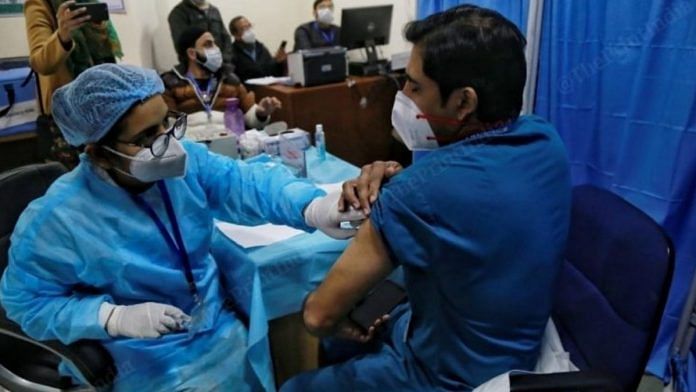The immunisation drive against the coronavirus that began on 16 January is a mammoth exercise in terms of resources, social mobilisation, communication, logistics and most importantly, data management. While it is visible that governments are thoroughly preparing on most fronts, there is an urgent need to acknowledge and sufficiently stress on the importance of having a robust data management system in place. This must involve designing data systems that enable useful analysis for evidence-based decision making in the future. The chaos and difficulties of data management during the containment of Covid-19 have been visible over the past year.
Since it’s the government that is primarily driving the vaccination exercise, the responsibility of the system design that collects, manages and analyses data for insights shall fall on the Ministry of Health and Family Welfare as well. However, ensuring that this system is utilised with accurate, clean and authentic data shall be the responsibility of the states.
Data synchronisation
The proposed data system should not be built in silo, without appropriate linkages to the massive data repositories built on Covid-19 infections. Backward and forward linkages of all data captured previously, and new data expected to be captured with the rollout, especially on beneficiaries, need to be thought through and put in. For example, months from now, if the administrators and medical professionals need insights into the effects and efficacy of the vaccine on beneficiaries who had been infected previously versus beneficiaries who had never been infected, or on beneficiaries with certain comorbidities versus none, the system should be able to pull out this analysis and throw conclusions based on vaccination data from across the states.
If beneficiaries get infected with Covid-19 months after the vaccine administration, the system should also be able to trace the vaccine and dosage administered, along with other details. This is especially critical since the vaccines have, so far, received only emergency use authorisation, and a lot more research on the immunisation data may help decisions on continued usage and conventional approval for commercial use of these as well as other vaccines.
With strict timelines under which the governments are operating, the first versions of data systems cannot be expected to be comprehensive and have all provisions of linkages. However, unless a dialogue on the subject pushes for continuous improvement of the platforms, we are bound to land in a situation where minimal to nil insights are gained from possibly the largest vaccination drive in the world.
Also read: Modi is the modern-day CEO of India — his vaccine leadership is proof
Infra for data collectors and privacy
Ideally, the mock drills before actual vaccination should also include focused drills of data entry so that the states and local administrators can plan for sufficient number of trained data entry operators, as required, for accurate and authentic tabulation. Learning from the Covid-19 experience, the skills and number of data entry operators form as crucial a part of data management as the data platform itself. Covid-19 data management saw multiple instances of duplication (such as parallel Covid-19 test reports prepared by the labs for the central portal by ICMR and for districts/state administration to inform the beneficiaries or Covid-19 death reports by hospitals for the state administration and their own records separately), absence of linkages for data integration and analysis, and manual recordkeeping even though digital platforms were made available due to lack of sufficiency of skills and number of operators.
A key aspect worth highlighting is the need to ensure security of this data collected and privacy of its beneficiaries. With such a mammoth data repository (three crore targeted beneficiaries in the first phase of vaccination), the government needs to put in place appropriate mechanisms compliant to the highest standards of security to minimise risks of identity theft amid other concerns.
The plans and needs of data systems shall evolve over time for them to be suited to the requirements of policymakers. But it is absolutely critical to invest in vaccination data systems — resources, thought and time — so that we have effective strategies backed by concrete evidence from across the country. A centralised system that is flexible and responsive to the states’ evolving requirements, for modifications at their levels, may make this exercise extremely insightful and useful for administrative, research and medical purposes.
Tulika Avni Sinha @AvniTulika is Lead Governance, Department of Governance Reforms, Government of Punjab. Views are personal.



